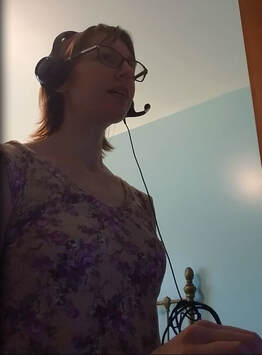|
Tell me what you like least and most about the blurb and draft cover for The Sisterhood of Motherhood.
As Bethany, the baby sister of the family, steps up to support her sister-in-law and brother through their infertility and cancer diagnosis, she steps into the role of a gestational surrogate. Determined to push herself beyond her comfort zone, Bethany faces a year of medical and legal challenges. She thinks she's prepared for the emotional, physical, and family changes that come with her decision but is soon surprised by shifting family dynamics and even questions her own motivations for surrogacy. Is she building up her family, or is she building up herself?
4 Comments
For the first time, I edited subtitles on a company YouTube video to better reflect what the speaker and interviewer said. I've wanted to make my company's content more accessible for some time, and it was easy to learn how to use YouTube's subtitle editor tool. One video down, about 160 more to go. Some of the speakers are going to have heavy accents or discuss specific scientific terminology, meaning auto-generated subtitles won't be sufficient. I'm excited to make each subtitle accessible for people who prefer captioned videos. In the past month, I also educated a local publisher on what alt text is and is for. Alt text is not something my company is adding to content, but for companies with the human and technology resources to add it, alt text is another important accessibility action item. If my own website is missing some accessibility feature, please let me know in a comment! Darla Nagel is a biomedical copy editor who has an invisible chronic illness. She wants to educate healthcare professionals and encourage patients. If you want to receive quarterly updates from her, email darla.nagel{a}gmail.com.
I finally got to copyedit a research study on ME/CFS! Dr. Maureen Hanson and her team published a study on metabolism in patients with ME before and after two days of strenuous exercise in the journal I copyedit for, JCI Insight. Read it here. I’ll summarize what I took away from reading the article multiple times. Direct any questions to the article authors, not to me, because I am not a scientist or clinician. Glutamate and vitamin B3 metabolism differed between patients and healthy controls, but there was no evidence for overall hypometabolism. In female patients, the data showed a gradual altering of something called the plasma metabolome resulting from exercise stress. There may be less passing of electrons through mitochondrial membranes in patients. Overall, exercise recovery is impaired in patients. I am grateful for any research published on ME, and to my mind, the only positive result from the pandemic is the heightened interest in ME research because of the similarities between long COVID and ME. I look forward to my next opportunity to copyedit an ME study for JCI Insight. Darla Nagel is a biomedical copy editor who has an invisible chronic illness. She wants to educate healthcare professionals and encourage patients. If you want to receive quarterly updates from her, email darla.nagel{a}gmail.com.
“We all carry scars...inside or out. You’re no different to the rest of us.” --Downton Abbey, Mrs. Hughes to Mr. Bates, who uses a cane Whether the disability is visible or not, we need to look at the commonalities rather than the differences between people with disabilities and people without. Darla Nagel is a biomedical copy editor who has an invisible chronic illness. She wants to educate healthcare professionals and encourage patients. If you want to receive quarterly updates from her, email darla.nagel{a}gmail.com.
Darla Nagel is a biomedical copy editor who has an invisible chronic illness. She wants to educate healthcare professionals and encourage patients. If you want to receive quarterly updates from her, email darla.nagel{a}gmail.com.
My first-ever blog post promoted person-first language when discussing people with disabilities, but some disabled people are advocating for identity-first language. We can embrace our disabilities as part of our identities in this way. It’s important to ask the people, when possible, the language they prefer to be used to describe them. If you’re curious about the reasons for the recent resurgence in identity-first language, here’s a summary of “Yes, You Can Call Me Disabled” by Anjali J. Forber-Platt, assistant professor at Vanderbilt University. Disability can be something to be proud of, but person-first language minimizes that point of pride. This pride could lead to positive changes for disabled people, such as improved access to resources and higher employment rates in more rewarding careers (thanks to reasonable accommodations). Forber-Platt says, “Intentional avoidance of the term disability sends the message that there’s something inherently negative or bad about having a disability. And disabled people are tired of non-disabled people telling us what they think is best for us.” Watch for further discussion of the benefits of hiring disabled employees in a future post. Darla Nagel is a biomedical copy editor who has an invisible chronic illness. She wants to educate healthcare professionals and encourage patients. If you want to receive quarterly updates from her, email darla.nagel{a}gmail.com.
In July I attended a virtual summit for people with chronic illnesses hosted by Lisa Sniderman. The speakers included practitioners, counselors, and patients, and for me two interviewees stood out: Danielle Lowe (music therapist for people with mental health conditions) and Amy Oestreicher (author, health advocate, and survivor of an exploded stomach). Lowe said, “So I guess what I would offer up is to, even though it can be hard sometimes, to advocate for ourselves, to make an effort to advocate for yourself when it’s difficult for what you need, whether it’s an accommodation or extra time or a different appointment or extra appointment, less appointments, to really check in with yourself for what you’re needing and ask for it. And if the other person isn’t willing to kind of accept that then you shouldn’t, you should find someone that will, and never be afraid [of] asking for what you need or for more help.” Oestreicher said, “Hope isn’t like this inspirational beam of light that’s just like, ‘Okay, I am going to have hope.’ Hope is like a job that we have to actively create….Hope is the fuel that gets us down a road that’s uncertain.” If you want additional lessons learned from chronic illness, email me, and I’ll send them your way! Darla Nagel is a biomedical copy editor who has an invisible chronic illness. She wants to educate healthcare professionals and encourage patients. If you want to receive quarterly updates from her, email darla.nagel{a}gmail.com.
“At nearly 20 percent of the U.S. population, people with disabilities represent one of the largest minority groups, but it has often been an overlooked one. That may be changing with a new wave of activism by those who want to change the way disability is viewed in the U.S.” —National Center on Disability and Journalism’s website We’re not seeing as much representation of people with visible and invisible disabilities in the media as we should given the recent surge in diversity/inclusiveness campaigns. Have you seen efforts to ensure vulnerable patients have easy access to personal protective equipment? Have you seen people using mobility aids or service animals in those ads that harp on how “we’re all in this together”? Now is the time to assert that our lives and our needs matter, too, and ought to be in the spotlight rather than shoved off to one side. What can people without disabilities do? Start by watching your language. Unless we ask to be called crippled, handicapped, impaired, or suffering, don’t call us that. We are people with disabilities, not the lifeless-sounding “the disabled.” Ask us whether and how we want our conditions mentioned in your writing and speeches. Then listen to us! You can learn more about acceptable versus unacceptable terms to use at the website mentioned above. The Americans with Disabilities Act was passed on July 26, 1990. #NCDJ30for30 Darla Nagel is a biomedical copy editor who has an invisible chronic illness. She wants to educate healthcare professionals and encourage patients. If you want to receive quarterly updates from her, email Darla.Nagel{a}gmail.com.
 I'm singing in my "recording studio." I'm singing in my "recording studio." I had the time and physical energy to write a book while staying home, but my heart led me toward music instead of writing. The people closest to me seemed to need comfort, the focus of my singing, rather than spurring to action, the focus of my nonfiction writing. With help and inspiration from Audacity, YouTube, and Flickr, I’ve posted a few personal music videos on Facebook. You can see my video of Twila Paris’s “How Beautiful” here. I will write again, but for now, I’m expressing my voice musically. Don’t be afraid to make your voice heard in a new way if that will reach your audience! Darla Nagel is a biomedical copy editor who has an invisible chronic illness. She wants to educate healthcare professionals and encourage patients. If you want to receive quarterly updates from her, email darla.nagel{a}gmail.com.
Take Daily as Needed by Kathryn Trueblood Never have I read a book that truly captures a feeling I've often had: guilt for the effects of one's chronic illness on one's family. Trueblood's 2019 novel is written as a chronological set of short stories centering on one somewhat dysfunctional family. It's an atypical novel focused on what may seem to be atypical experiences but actually are the norm for countless families. Because there is so little well-written fiction concerning a family with various emotional and physical disabilities and illnesses, this book helps fill that void and is therefore valuable. There are books you read to escape from the harshness of life, and there are books you read to find empathy in dealing with the harshness of life. Those who seek the latter will find it in Take Daily as Needed. The illnesses focused on are ADHD and Crohn’s. You can learn more about the book on Goodreads. The Clear Skin Diet by Nina and Randa Nelson If you’re searching for a radical way to eliminate acne and for research that counters the commercial food industry’s claims that we need meat, dairy, and fat in our diets to survive, you’ll find it in The Clear Skin Diet (2018). Dozens of young people following the plan, which eliminates all animal products, oils, and high-fat plant products and promotes fresh, unprocessed foods (I know, that might make you quit reading right there, but humor the beautiful authors for several more chapters), totally cleared their severe acne. The photos, testimonials, and snippets from nutritionists and functional medicine doctors appear honest and dramatic. The book is written in an approachable style and provides counterarguments for common objections and over a dozen recipes. I was inspired to try the diet, following it 80% for four weeks as my specialist recommended. You need to consult with your own physician before making such a radical change. That is not emphasized enough in this book. I made extra trips to the bathroom the first three days of the diet (eating way more fiber!!). (If it helps my acne, I’ll let you know in a separate post. I’m only a week in.) Those with cystic acne, food allergies, or depression should consider this book. You can view the authors’ website at ClearSkinDiet.com. Darla Nagel is a biomedical copy editor who has an invisible chronic illness. She wants to educate healthcare professionals and encourage patients. If you want to receive quarterly updates from her, email darla.nagel{a}gmail.com.
|
Author:
|




 RSS Feed
RSS Feed